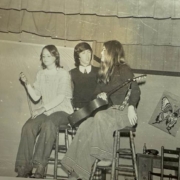Sometimes It’s Hard to Tell the Living from the Dead | Healthy Aging Series: S11 E24
Basement Stories
A lot of memorable things have happened in basements. One of my favorite movies is “Signs.” The basement scene is great! The world is being invaded by aliens. Mel Gibson’s character, Graham, is holding his basement doorknob to prevent the aliens from getting into the basement. Kind of funny. The aliens can’t get in because Father Graham Hess is holding the doorknob.
I love the interchange between Graham and his brother Merrill after they had a conversation upstairs about faith versus luck. In the upstairs scene, Graham, the former Episcopalian Priest, tells his brother Merrill that he doesn’t have his faith anymore. And in the basement, this is what Merrill says:
Listen, there’s things I can take and a couple things I can’t and one of them I can’t take, is when my older brother, who is everything I want to be, starts losing faith in things.
I saw your eyes last night. I don’t ever want to see your eyes like that again, OK? I’m serious.
I love the scene in Terminator 3 were John Connor and Kate Brewster remember that the two of them had met first in Mike Kripke’s basement, “where Middle School kids went to make out.”
It seems like many of my high school memories were in basements. Parties. Sleepovers. Music. I had a high-school best friend, Jeff Wilson, who had a quadraphonic sound system. I remember sitting in the center of the room, in his basement, with a speaker in each corner as he played “Roundabout,” by Yes, and then, “Frankenstein,” by Edgar Winter. I became an instant fan of both in the fall of 1973.
Recently I’ve become acquainted with Edgar Winter’s song, “Dying to live.” I’ve taken the title of this episode from a line in that song. Stop reading and pull it up on whatever streaming app you use and listen to it. Here are the lyrics:
Dying to Live
Mmm
You know I’ve heard it said there’s beauty in distortion
By some people who withdraw to find their head
Now they say that there is humor in misfortune
Sometimes I wonder if they’ll laugh when I am dead
Why am I fighting to live
If I’m just living to fight?
Why am I trying to see
When there ain’t nothing in sight?
Why am I trying to give
When no one gives me a try?
Why am I dying to live
If I’m just living to die
Yeah
You know some people say that values are subjective
But they’re just speaking words that someone else has said
And so, they live and fight and kill with no objective
Sometimes it’s hard to tell the living from the dead
So, I’ll keep fighting to live
If there’s no reason to fight
And I’ll keep trying to see
Until the end is in sight
You know I’m trying to give
So come on give me a try
You know I’m dying to live
Until I’m ready
Until I’m ready
Until I’m ready
Til I’m ready to die
Hey, hey, hey, hey
Source: LyricFind
Songwriters: Edgar Winter
Dying to Live lyrics © Sony/ATV Music Publishing LLC
This season I’m sharing some Stoic practices, using William Irvine’s book, “A Guide to the Good life,” as my source. This episode is about death and dying, or more precisely, how to develop a coherent philosophy of death and dying.
Edgar Winters’ Philosophy of Dying
First, the Edgar Winters’ philosophy of dying. His philosophy of dying is tied up completely in his philosophy of living. “Are you dying to live?” he asked. What does that even mean?
When he sings, “Are you dying to live,” he means “Are you yearning to live,” not just waking up, breathing, farting, showering, shaving, and then at the end of the day going back to bed. To be repeated thirty thousand times if you live to be ninety. That’s living to die. That’s Nihilism. Nihilists believe that life has no meaning and that nothing matters.
Not Nihilism
Yearning to live is living a life of purpose and meaning. It’s the opposite of finding beauty in distortion, humor in misfortune, not believing anything or valuing anything. It’s the opposite of not having a voice or opinion and fighting just for the sake of fighting. Dying to live means fighting for a cause that you find meaningful, and fight with all your strength until you find victory; and it means fighting for others, fighting for those less fortunate. It means fighting for our Mother Earth.
Dying to live means seeking out the light, seeking out wisdom, looking around and helping others see, helping others find their way, spreading light, not heat, not fear, not hate. Dying to live means giving till it hurts, it means burning out rather than rusting out. It means, having something to die for, to sacrifice yourself for. And doing all these things until, one day, one day in the future, decades from now from most of us, you’re ready to die. My mother was ready to die when I sat by her bed, I took her by the hand and said, “Mom it’s Kimmer, I’m here.”
Moments later, she was ready to die, and she left us with all those beautiful memories, love, and care. She kept fighting, seeing, and giving, until she was ready to die.
Stoicism and Dying
The Stoics had a very similar view. No surprise.
Irvine writes:
“It may seem paradoxical, but having a coherent philosophy of life, whether it be Stoicism or some other philosophy, can make us more accepting of death. Someone with a coherent philosophy of life will know what in life is worth attaining, because this person has spent time trying to attain the thing in life, he believed to be worth attaining he has probably attained it, to the extent that it is possible for him to do so consequently when it comes to time for him to die, he will not feel cheated. On the contrary he will, in the words of Musonius, “Be set free from the fear of death.”
What does death and dying look and feel like without a meaningful and coherent philosophy of living? Irvine explains:
“Those who live without a coherent philosophy of life, though, will desperately want to delay death. He might want to delay so that they can get the thing that, at last, they have discovered to be of value. Or they might want the delay because their improvised philosophy of life has convinced them that what is worth having in life is more of everything, and they cannot get more of everything if they die.”
Stoicism and Mortality Awareness
How does contemplating our deaths, how does a coherent philosophy of death, which means thinking about our mortality, benefit us and result in our tranquility?
Here is a longer quote from Irvine:
“When stoics contemplate their own death, it is not because they long for death but because they want to get the most out of life. As we have seen, someone who thinks he will live forever is far more likely to waste his days than someone who fully understands that his days are numbered, and one way to gain this understanding is periodically to contemplate his own death. Likewise, when the Stoics live each day as if it were their last, it is not because they plan to take steps to make that day their last; rather, it is so they can extract the full value of that day, and hopefully, the days that follow it. When the Stoic teaches us not to fear death, they are simply giving us advice on how to avoid a negative emotion. We are all going to die, after all, and it is better that our death is not marred by fear.”
What’s Your Philosophy of Dying?
I think many use their religious or spiritual beliefs to ease the fear of death and dying. When you die you go to heaven or paradise. I know many and have read many agnostics, or those that have a more secular view of the hereafter. When you die you simply stop existing. There are many that believe in reincarnation. Regardless, I believe it’s the life that you live now that will make death more palatable.
I’m dying to live until I’m ready to die.
There’s a lot of
fightin’,
livin’,
seein’,
givin’,
sharin’,
and learnin’ to do, and when I’m done with all that,
I’m ready.













